Home Tags Posts tagged with "Pheu Thai Party"
Pheu Thai Party
Thai constitutional court has rejected an opposition request to annul the February 2 election, citing insufficient grounds.
The Democrat Party had argued that the poll violated the constitution for several reasons, including that it was not completed in one day.
The government blamed the delay on the opposition blocking polling stations.
Thailand has been in a political crisis since mass anti-government protests kicked off in November.
They were sparked by a controversial amnesty bill which critics said would allow former leader Thaksin Shinawatra to return to Thailand without serving time in jail for his corruption conviction.
The demonstrators have since called for the resignation of PM Yingluck Shinawatra, Thaksin’s sister, and her government.
Yingluck Shinawatra had called the election in the hope of defusing the crisis.
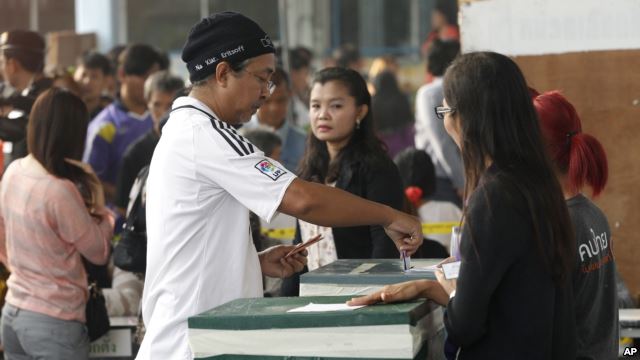
Thai constitutional court has rejected an opposition request to annul the February 2 election
But the Democrats refused to contest the election – which they were almost certain to lose – arguing that reform of Thailand’s political system must come first.
The constitutional court annulled a previous election seven years ago for seemingly trifling irregularities.
It has also twice dissolved previous incarnations of the ruling Pheu Thai party and twice forced prime ministers from office.
This time though, the court dismissed the petition saying there was no credible evidence that the election had violated the constitution.
The opposition movement has not exhausted legal avenues for blocking the government, our correspondent says.
They are still hoping an official corruption investigation into Yingluck Shinawatra and other ministers will prevent her from forming a new government.
Wiratana Kalayasiri, a former opposition lawmaker and head of the Democrat Party’s legal team, who brought the opposition petition to court, said: “This case is over.”
“But if the government does anything wrong again, we will make another complaint,” he told the AFP news agency.
Millions were prevented from voting because anti-government protesters forced the closure of hundreds of polling stations in Bangkok and in the south on election day.
It means the results of the election cannot be announced until special polls have been held in the constituencies that missed out on the February 2 vote.
The Election Commission said on Tuesday that those elections will be held on April 27.
However, no decision has yet been made on the 28 constituencies where no candidates stood in the election.
[youtube 7Bvhm8jl4ao 650]
Thailand’s general election has been disrupted by protests with voting being halted in parts of Bangkok and the south, but officials say that 89% of polling stations operated normally.
Some six million registered voters were affected by the closures, the Election Commission said.
Prime Minister Yingluck Shinawatra called the vote to head off weeks of mass protests.
Her party is widely expected to win but legal challenges and a lack of a quorum of MPs may create a political limbo.
Security has been heavy throughout Thailand, with vast areas under a state of emergency.
“The situation overall is calm and we haven’t received any reports of violence this morning,” National Security Council chief Paradorn Pattanatabutr told Reuters.
Security officials said about 130,000 personnel had been deployed across Thailand on Sunday, including 12,000 in Bangkok.
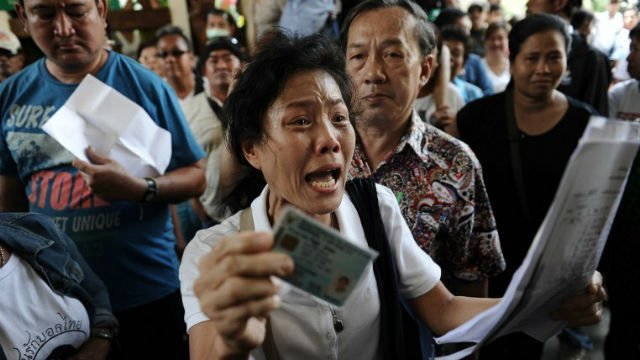
Thailand’s general election has been disrupted by protests with voting being halted in parts of Bangkok and the south
There has been little campaigning for the election and it was unclear how many Thais had turned out.
Yingluck Shinawatra, who won the last election in 2011, voted soon after polls opened near her Bangkok home.
Protests prevented voting from taking place in 438 of Bangkok’s 6,671 polling stations, and there was no voting at all in nine southern provinces.
The government said there was no disruption in the north and north-east of the country.
Yingluck Shinawatra’s Pheu Thai party has overwhelming support in these regions, while the south and parts of the capital are strongholds of the opposition Democrat Party, which is boycotting the election.
Demonstrators blocked access to voters at some polling stations in the capital and prevented ballot papers reaching those polling stations.
Some voters expressed frustration when they found their local polling stations blocked.
[youtube RZVpykfl-KU 650]
The Thai polling has now ended in a general election boycotted by the opposition and blighted by protests.
Anti-government activists forced some polling stations in Bangkok and the south to close but a large majority elsewhere were said to be peaceful.
Prime Minister Yingluck Shinawatra called the vote to head off weeks of mass protests aimed at forcing her to resign.
Her party is widely expected to win but legal challenges and a lack of a quorum of MPs may create a political limbo.
Yingluck Shinawatra, who won the last election in 2011, voted soon after polls opened on Sunday near her Bangkok home.
Her opponents took to the streets in November after her government tried to pass an amnesty law that would potentially have allowed her brother, Thaksin Shinawatra, to return from exile.
Thaksin Shinawatra, a former prime minister who fled during a court case in 2008, is reviled by the protesters, who say he controls the government from abroad.
Security has been heavy throughout Thailand, with vast areas under a state of emergency because of the protests.
“The situation overall is calm and we haven’t received any reports of violence this morning,” National Security Council chief Paradorn Pattanatabutr told Reuters.
Security officials said about 130,000 personnel had been deployed across Thailand on Sunday, including 12,000 in Bangkok.
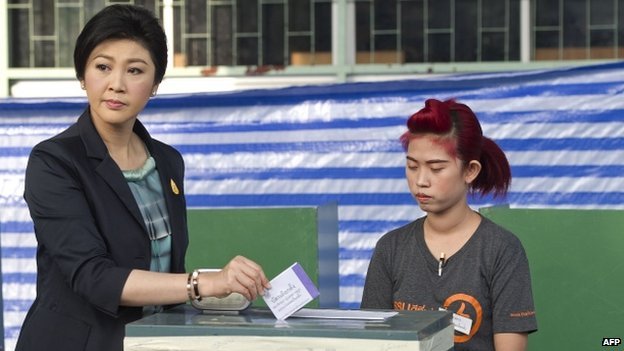
Yingluck Shinawatra, who won the last election in 2011, voted soon after polls opened on Sunday near her Bangkok home
There has been little campaigning for the election and it was unclear how many Thais had turned out.
Voting in 13 of Bangkok’s 33 constituencies, and in 37 of 56 constituencies in the south was disrupted.
These are strongholds of the opposition Democrat Party, which is boycotting the election.
Some voters expressed frustration when they found their local polling stations blocked.
One high-profile politician, independent candidate and anti-corruption campaigner Chuwit Kamolvisit, brawled with anti-election activists.
“They tried to attack me while I was trying to vote,” he said.
Polling in the rural north and east, where Yingluck Shinawatra’s Pheu Thai party has overwhelming support, was largely unaffected.
“Today is an important day,” Yingluck Shinawatra said as she voted.
“I would like to invite Thai people to come out and vote to uphold democracy.”
However, disruption to candidate registration means that even if she wins, there will not be enough MPs in parliament for Yingluck Shinawatra to have full power over government policy, and by-elections will be needed.
The opposition is also likely to mount legal challenges to the election.
Yingluck Shinawatra’s party is already facing a host of challenges in the courts aiming to disband it, as has happened with pro-Thaksin parties in the past.
The Democrat Party, which is allied to the protesters, has been unable to win a majority in parliament for more than two decades.
Many of its members want the government to be replaced by an unelected “people’s council” that would oversee wide reform of the political system.
Trouble broke out in Bangkok on Saturday in a violent clash between pro- and anti-government groups.
A gun battle erupted in the Lak Si constituency as anti-government protesters blockaded a building storing ballot papers. At least seven people were wounded.
[youtube bGKpC5eGCzs 650]
Violent clashes involving anti-government protesters have erupted ahead of Sunday’s elections in Thai capital, Bangkok.
According to local media, several people have been injured by gunfire.
The violence erupted during a stand-off between supporters and opponents of PM Yingluck Shinawatra.
The shots were fired as demonstrators blockaded a building where ballot papers are being stored, in an attempt to prevent their distribution.
Protesters want the government replaced by an unelected “people’s council”.
The opposition has vowed to boycott Sunday’s poll, which is likely to be won by Yingluck Shinawatra.
The incident took place in Bangkok’s Laksi district, a stronghold of the prime minister’s Pheu Thai party.
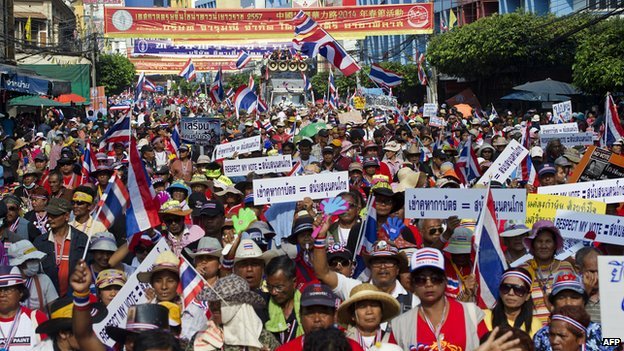
Thai protesters want Yingluck Shinawatra’s government replaced by an unelected people’s council
A number of people could be seen lying injured on the road, as exchanges of gunfire continued, forcing reporters and passers-by to flee for cover.
It was not immediately clear whether those wounded were government supporters or opponents.
The protest movement has vowed to disrupt the election as much as possible, by preventing ballot papers from reaching polling stations.
The army earlier said it would increase the number of troops deployed in Bangkok for the polls on Sunday. Some 10,000 police will also patrol the streets.
The protests began in November, after the lower house backed a controversial amnesty bill that critics said would allow Yingluck Shinawatra’s brother, Thaksin Shinawatra, to return.
Yingluck Shinawatra called early elections to quell the unrest, but demonstrators have vowed to block the poll from going ahead.
Correspondents say one election commissioner has predicted that 10% of polling stations will not be able to open at all on Sunday.
Because of disruption to candidate registration, the elections will also not deliver enough MPs for a quorum in parliament, meaning that by-elections will be needed before a government can be approved, extending the instability.
[youtube 4qbBH7Dx3fs 650]
Thai government said it would ask the army to provide security for February’s elections, as the military called for restraint on both sides.
Thailand is facing increasingly violent protests, with two killed and dozens injured in recent days.
On Thursday, the Electoral Commission said the polls should be postponed to ensure the safety of candidates.
However, government officials said parliament was already dissolved so there was no legal reason for a delay.
Fighting broke out on Thursday at a stadium where election candidates were being registered.
A group of protesters, some throwing stones and evidently some who were armed, tried to break into the stadium.
One police officer and one protester were killed in the clashes.
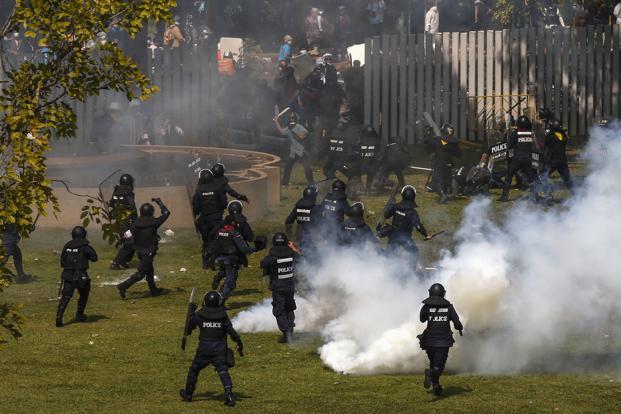
Thailand is facing increasingly violent protests, with two killed and dozens injured in recent days
Deputy PM Surapong Tovichakchaikul said the government would ask the army to help secure candidate registrations on Saturday.
“I will also ask the military to provide security protection for members of the public on the 2 February elections,” he added in a televised address.
Speaking to reporters on Friday, Thai army chief Prayuth Chan-ocha did not address the government’s request.
Instead, he urged restraint on both sides and an end to street violence and said the army had shown “red traffic lights to both sides so things will calm down”.
When asked if the army would intervene, Prayuth Chan-ocha said: “That door is neither open nor closed.”
The army, which mounted a successful coup only seven years ago, remains a powerful player in Thai politics.
The army has staged several coups in the past, and ousted former PM Thaksin Shinawatra, who is also brother to current premier Yingluck Shinawatra, in 2006.
Yingluck Shinawatra called the snap election earlier this month, following weeks of protests.
However, the opposition Democrat party is boycotting the polls.
Yingluck Shinawatra’s Pheu Thai Party won the last election in 2011 and has a big majority in parliament.
[youtube OsbcXXd3TwQ 650]
Thai riot police have fired teargas at protesters trying to prevent political parties from registering for February’s elections at Bangkok’s stadium.
About 500 protesters tried to storm Thai-Japanese stadium where election commission officials were working.
PM Yingluck Shinawatra called the snap elections after weeks of protests that demanded an unelected “people’s council” take power.
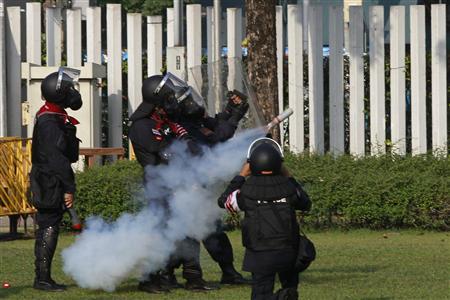
Thai riot police have fired teargas at protesters trying to prevent political parties from registering for February’s elections
The demonstrators say political reforms are needed before polls can take place.
On Thursday, the protesters – some of whom were throwing stones – tried to break into the stadium where the electoral commission was registering candidates.
But police responded with tear gas, dispersing the crowd.
There were no reports of serious injuries.
Yingluck Shinawatra dissolved parliament and called an election on December 9th, after more than 150,000 demonstrators took to the streets calling for her government to step down.
Last Sunday, she said elections must take place and urged protesters to express their views at the ballot box.
“If we don’t hold on to the democratic system, what should we hold on to?”
Her Pheu Thai Party won the last election in 2011, and has a majority in parliament.
However, protesters say Yingluck Shinawatra’s brother – ousted former leader Thaksin Shinawatra – remains in charge.
Thaksin Shinawatra is currently in self-imposed exile after he was overthrown in a military army coup in 2006 and convicted of corruption.
[youtube S1Q9ZDV0g0g 650]
Thai anti-government protesters have surrounded the stadium where candidates were due to register to stand in February’s elections.
They say political reform is needed before elections take place.
On Sunday, tens of thousands took to the streets of the capital Bangkok, calling on the government to step down.
PM Yingluck Shinawatra, who called the polls in December try to end the rallies, urged protesters to respect the “democratic system”.
The main opposition Democrat Party has said it would boycott February’s elections.
Protest leader Suthep Thaugsuban, who was previously a senior Democrat Party politician, said on Sunday: “We disagree with the election. We want the country to be reformed before the election.”
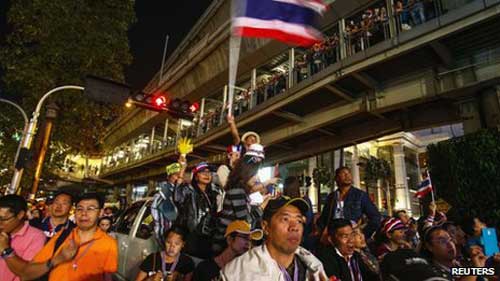
Thai anti-government protesters have surrounded the stadium where candidates were due to register to stand in February’s elections
He urged protesters to gather outside Bangkok’s Din Daeng Thai-Japan Stadium, where candidate registrations were set to take place, on Monday.
“If you want to apply for candidacy, you must walk past our feet first,” Suthep Thaugsuban said.
Political parties began registering their candidates at a local police station instead, while protesters responded by surrounding the police station as well, correspondents say.
Yingluck Shinawatra dissolved parliament and called an election on December 9, after more than 150,000 demonstrators took to the streets calling for her government to step down.
On Sunday, Yingluck Shinawatra told reporters that elections must take place, and urged protesters to express their views at the ballot box.
She said: “If we don’t hold on to the democratic system, what should we hold on to?”
“If you don’t accept this government, please accept the system,” Yingluck Shinawatra added.
Yingluck Shinawatra’s Pheu Thai Party won the last election in 2011, and has a majority in parliament. However protesters say her brother – ousted former leader Thaksin Shinawatra – remains in charge.
The protesters also accuse the Pheu Thai Party of using public funds irresponsibly to secure votes.
[youtube KNlenAJopio 650]
Thailand’s main opposition party has decided to boycott snap elections set for February 2, 2014.
Democrat Party leader Abhisit Vejjajiva told a news conference it would not be fielding candidates, saying: “Thai politics is at a failed stage.”
PM Yingluck Shinawatra called the election earlier this month in a bid to end weeks of mass protests.
The head of the Thai army has warned the country’s political divisions could “trigger a civil war”.
General Prayuth Chan-ocha has proposed a “people’s assembly” – made up of civilians from both sides, not the leaders, to heal the divisions.
The opposition-backed protests in Bangkok have caused Thailand’s most serious political turmoil since 2010.
Yingluck Shinawatra won the last elections in 2011, but protesters say her brother – the controversial ousted former leader Thaksin Shinawatra – remains in charge.
At his news conference, Abhisit Vejjajiva told reporters his party had agreed it would not field candidates in the snap elections.
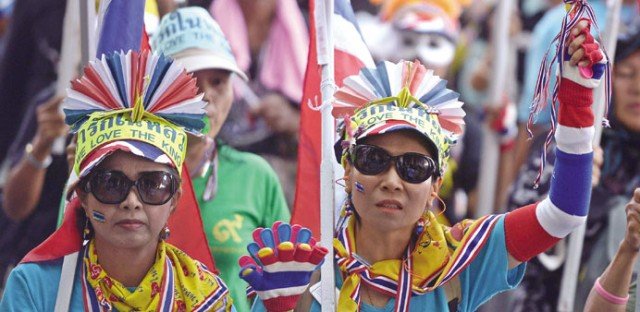
Thailand’s main opposition party has decided to boycott snap elections set for February
“The Thai people have lost their faith in the democratic system,” he said.
The prime minister dissolved parliament and called the election on December 9 in a bid, she said, to avoid violence on the streets and “to give back the power to the Thai people”.
Her Pheu Thai party has a majority in parliament, and draws significant support from Thailand’s rural areas. It is seen as well-placed to win February’s election.
General Prayuth Chan-ocha said he was deeply concerned by the latest crisis, with divisions not just in Bangkok but across the whole country.
“The situation could trigger a civil war,” he told the Bangkok Post.
Setting out his vision of a “people’s assembly”, he said it should be made up of people from both sides of the political divide – known as the “red shirts”, those who support Thaksin Shinawatra, and the “yellow shirts”, those who oppose him.
“It must be from a neutral group and comprise non-core representatives of all colors, and all color leaders must be excluded,” he said.
General Prayuth Chan-ocha did not give details on how or when the assembly would be set up, but said any proposal “must come from a public consensus and the public must brainstorm how to reach that consensus”.
He stressed his grouping would be different to the “people’s council” proposed by the opposition.
“The people’s assembly must not be organized or sponsored by any conflicting group, as it would not be accepted by the other side,” he said.
His comments came after a defense council meeting on Friday to discuss the February 2 election.
Defense spokesman Col Thanatip Sawangsaeng said the army “is ready to support the Election Commission in organizing the elections when asked”.
[youtube t6OZN-s2tRE 650]
Thailand’s PM Yingluck Shinawatra has rejected protesters’ demands that she resign before February’s snap elections.
Demonstrators have been calling for Yingluck Shinawatra to resign and be replaced with a “people’s prime minister”.
Yingluck Shinawatra won the last polls in 2011, but protesters say ex-leader Thaksin Shinawatra remains in charge.
Thailand is facing its largest political turmoil since 2010.
Speaking to reporters on Tuesday, Yingluck Shinawatra urged protesters to stop and “use the electoral system to choose who will become the next government”.
“I must do my duty as caretaker prime minister according to the constitution,” she said.
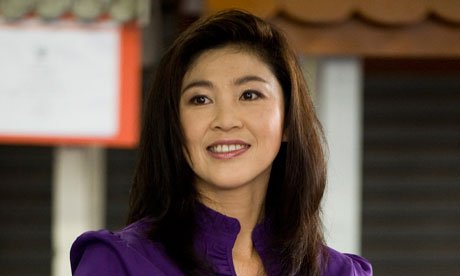
Yingluck Shinawatra has rejected protesters’ demands that she resign before February’s snap elections
She added: “I have retreated as far as I can – give me some fairness.”
On Monday, around 150,000 protesters had converged around the government headquarters in what they had described as a final push to unseat the government.
On the same day, Yingluck Shinawatra announced that she would dissolve parliament and call elections, now set for February 2.
However, protest leader Suthep Thaugsuban, a former opposition politician, said that the demonstrations would continue.
“We will select a people’s prime minister and set up a government of the people and a people’s assembly to replace parliament,” he said late on Monday.
On Tuesday the streets were quiet and the number of protesters had diminished significantly.
However, a small core of protesters remained outside government buildings, correspondents said.
Yingluck Shinawatra’s Pheu Thai party has a majority in parliament, and draws significant support from Thailand’s rural areas. The party is seen as well-placed to win February’s election.
Anti-government protesters say Yingluck Shinawatra’s party is controlled by ousted leader Thaksin Shinawatra.
They accuse it of using public funds irresponsibly to secure votes and want her government to be replaced with an unelected “People’s Council”.
Thaksin Shinawatra, a polarizing politician, is in self-imposed exile after he was overthrown in a military army coup in 2006 and convicted of corruption.
[youtube AC91XdSGrY4 650]
Thailand’s PM Yingluck Shinawatra has announced she will dissolve parliament and call an election, after sustained protests in the capital, Bangkok.
The move followed the resignation of all opposition MPs from parliament on Sunday, and a planned march on Government House on Monday.
Yingluck Shinawatra won elections in 2011.
However, the protesters allege Yingluck Shinawatra’s government is controlled by ousted leader Thaksin Shinawatra, and have vowed to continue the demonstrations.
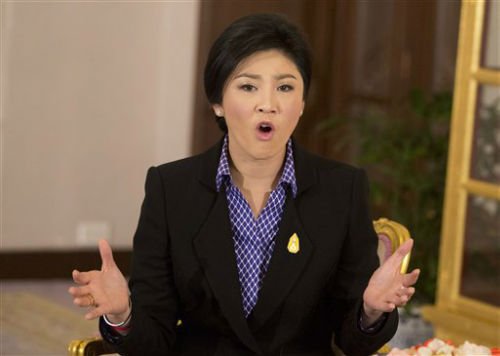
Thailand’s PM Yingluck Shinawatra has announced she will dissolve parliament and call an election
The announcement came as Yingluck Shinawatra addressed the nation on television.
“The government does not want any loss of life,” she said.
“At this stage, when there are many people opposed to the government from many groups, the best way is to give back the power to the Thai people and hold an election,” Yingluck Shinawatra said.
“So the Thai people will decide.”
No date was given for the polls but Yingluck Shinawatra said they would be held “as soon as possible”.
In the general election in July 2011, Yingluck Shinawatra ‘s Pheu Thai party won a majority, with 265 seats to the Democrat Party’s 159 seats.
Under Thailand’s electoral regulations polls must be held within two months of parliament being dissolved.
[youtube VXEmw0k60Gw 650]
Hundreds of Thai protesters forced their way into the army headquarters in Bangkok, on the sixth day of anti-government rallies.
The protesters broke open a gate, held a rally in the compound asking for the army’s help in their campaign, and later withdrew without confrontation.
On Thursday, Thai Prime Minister Yingluck Shinawatra called for an end to the demonstrations after surviving a no-confidence vote.
But protest leader Suthep Thaugsuban has rejected her appeal.
“We will not let them work anymore,” the former senior opposition lawmaker said in a speech late on Thursday.
On Friday, at least 1,000 protesters forced their way into the army headquarters compound, but did not enter any buildings.
They urged the army to come out in support of the demonstrators.
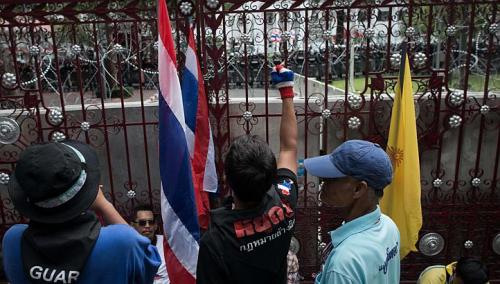
Hundreds of Thai protesters forced their way into the army headquarters in Bangkok, on the sixth day of anti-government rallies
“We want to know which side the army stands on,” Reuters news agency quoted one protester as saying.
Meanwhile security was tightened around the ruling Pheu Thai party headquarters, where more protesters had massed.
Demonstrators have been surrounding and occupying official buildings this week in an attempt to disrupt the government.
During the demonstrations, which have been largely peaceful so far, participants have cut the electricity supply to the national police headquarters and forced the evacuation of Thailand’s top crime-fighting agency.
The protesters say Yingluck Shinawatra’s government is controlled by her brother, exiled former leader Thaksin Shinawatra.
Yingluck Shinawatra has invoked special powers allowing curfews and road closures, and police have also ordered the arrest of Suthep Thaugsuban – but so far no move has been made to detain him.
In a televised address on Thursday, Yingluck Shinawatra said the protesters should negotiate with the government.
“The government doesn’t want to enter into any political games because we believe it will cause the economy to deteriorate,” Yingluck Shinawatra said.
[youtube c2e6bsz7rso 650]
Thailand’s PM Yingluck Shinawatra has survived a no-confidence vote in parliament, amid major street protests in Bangkok.
The motion was brought by the opposition Democrat Party, but Yingluck Shinawatra’s Pheu Thai party dominate the chamber and voted it down.
Yingluck Shinawatra’s government is facing the biggest demonstrations to hit Thailand since the violence of 2010.
UN chief Ban Ki-moon has voiced concern over the tensions and urged restraint.
Protests began in Bangkok on Sunday. Since then, demonstrators calling on the government to step down have marched on ministries and government bodies in an attempt to shut them down.
The demonstrators, who are led by a former opposition party lawmaker, say Yingluck Shinawatra’s government is controlled by her brother – the ousted former leader Thaksin Shinawatra.
Yingluck Shinawatra has invoked special powers allowing curfews and road closures and police have also ordered the arrest of the protest leader – but so far no move has been made to detain him.
The protests have been largely peaceful and correspondents have described the mood of the rallies as friendly.
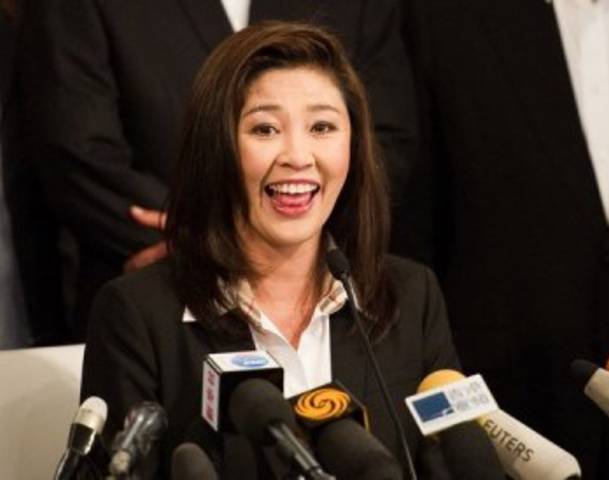
PM Yingluck Shinawatra has survived a no-confidence vote in parliament, amid major street protests in Bangkok
On Wednesday, hundreds of protesters surrounded Thailand’s top crime-fighting agency, forcing its evacuation.
Ban Ki-moon has urged all sides to “to exercise the utmost restraint, refrain from the use of violence and to show full respect for the rule of law and human rights”.
Yingluck Shinawatra won 297 votes, easily surviving the lower house censure motion, while 134 voted against her.
So far protesters have succeeded only in disrupting the business of government for a few days, and the authorities have been careful not to risk violence by confronting them.
Thaksin Shinawatra was ousted in a military coup in 2006 that left the country bitterly divided.
In 2010, thousands of “red-shirt” Thaksin Shinawatra supporters occupied key parts of the capital. More than 90 people, mostly civilian protesters, died over the course of the two-month sit-in.
Yingluck Shinawatra and the Pheu Thai Party were subsequently voted into office, and Thailand’s political landscape has remained largely stable since then.
[youtube z16Whv39xz4 650]
Thai protesters have surrounded several more ministries, as street demonstrations continue in Bangkok.
The protesters want Yingluck Shinawatra’s government to resign, saying it is controlled by her brother – ousted former PM Thaksin Shinawatra.
After a huge rally on Sunday, they marched to several Bangkok locations.
Late on Monday, Yingluck Shinawatra invoked special powers allowing officials to impose curfews and seal roads.
The protests have been triggered by a controversial political amnesty bill.
The demonstrators say the legislation – which failed in the Senate – would have allowed Thaksin Shinawatra to return to Thailand without serving a jail sentence for corruption.
Thailand has been bitterly divided since Thaksin Shinawatra was ousted in a military coup in 2006 and the proposal re-ignited simmering political tensions.
Groups of protesters, who are being led by former opposition Democratic Party lawmaker Suthep Thaugsuban, camped out at the foreign and finance ministries overnight.
On Tuesday, they surrounded the interior, tourism, transport and agriculture ministries.
There were around 1,000 protesters gathered outside both the finance and interior ministries, blowing whistles and chanting “get out!”, reports said.
“We have to leave because they [the protesters] will cut the utilities,” Tourism and Sports Minister Somsak Pureesrisak told AFP news agency.
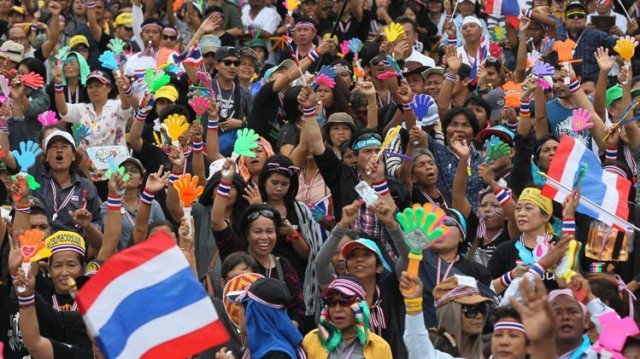
Thai protesters have surrounded several more ministries, as street demonstrations continue in Bangkok
Akanat Promphan, a protest spokesman, said: “We are occupying the finance ministry in a non-violent and peaceful way, so our supporters around the country can do the same and occupy all government offices.”
“Tomorrow there will be a nationwide movement,” he added.
However, Thida Thavornseth, a leader of the “red shirts”, who support Thaksin Shinawatra, told AFP news agency: “Suthep [Thaugsuban] is not trying to throw out the government… he wants to throw out democracy and replace it with an ultra-royalist administration.”
The opposition Democrat Party has also started a censure motion in parliament against the government, over its alleged misuse of the budget.
The motion highlights an expensive rice subsidy scheme launched by the government after it took office.
Under the scheme, the government bought rice directly from farmers, paying more than the market rate. India and Vietnam increased their share of global rice exports as a result, overtaking Thailand as the world’s largest rice exporter.
The government is expected to defeat the censure motion, since the ruling Pheu Thai party has a majority in parliament.
The protests are the biggest to hit Thailand since the violence of 2010, when “red-shirt” opponents of the then Democratic Party government occupied key parts of the capital.
More than 90 people, mostly civilian protesters, died over the course of the two-month sit-in.
A government led by Yingluck Shinawatra and the ruling Pheu Thai Party was subsequently elected and since then Thailand has remained relatively politically stable.
But the opposition accuses Thaksin Shinawatra of running the government from self-imposed exile overseas, and the now-shelved amnesty bill has served as a spark for renewed protests.
Yingluck Shinawatra invoked the Internal Security Act late on Monday. But she said on Tuesday the government would not use violence to end the protests.
“Everybody must obey the law and not use mob rule to upstage the rule of law,” she told reporters.
“If we can talk, I believe the country will return to normal,” she added.
[youtube H6UhBPLrlqQ 650]













